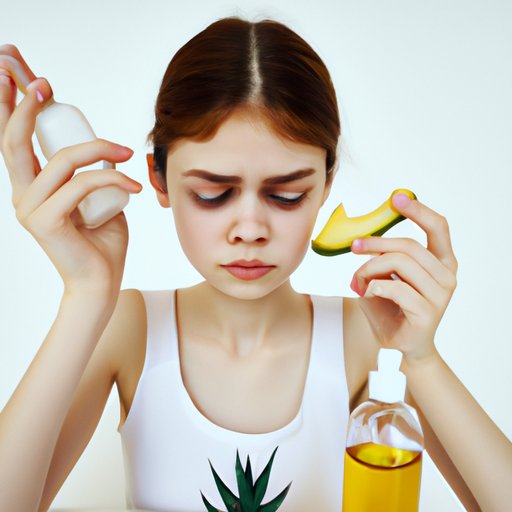Introduction
Acne is a common skin condition that affects people of all ages. It is characterized by red, inflamed blemishes on the face, neck, chest, and back. Acne can cause physical discomfort as well as psychological distress, leading to feelings of insecurity and low self-esteem. Fortunately, there are several steps you can take to reduce the severity of symptoms and prevent future breakouts.
Daily Skin Care Routines
One of the most important steps for reducing acne is to establish a consistent skin care routine. Following these simple steps can help keep your skin healthy and clear:
Wash the face twice a day with a gentle cleanser: It’s important to wash the face twice a day—once in the morning and once at night—to remove dirt, oil, and bacteria that can clog pores and cause breakouts. Choose a gentle, non-abrasive cleanser that won’t strip the skin of its natural oils.
Avoid touching or picking at blemishes: It can be tempting to pick at blemishes, but this can spread bacteria and make the breakout worse. Avoid touching the face altogether, and if you do, be sure to wash your hands first.
Stay hydrated with plenty of water: Staying hydrated can help flush out toxins from the body and keep the skin looking radiant and healthy. Aim for at least eight glasses of water per day.
Diet and Nutrition
What you put into your body has a direct impact on your skin health. Eating a balanced diet rich in vitamins and minerals can help nourish the skin from within and reduce inflammation. Additionally, avoiding foods high in sugar and fat can help prevent breakouts. Some specific dietary changes to consider include:
Eating a balanced diet rich in vitamins and minerals: Fruits and vegetables are packed with essential vitamins and minerals that are necessary for good skin health. Aim to eat five servings of fruits and vegetables per day, and don’t forget to incorporate other nutrient-rich foods like whole grains, lean proteins, and healthy fats into your diet as well.
Avoiding foods high in sugar and fat: Foods that are high in sugar and fat can trigger inflammation and lead to breakouts. Try to limit processed and fast food, as well as sugary snacks and drinks. Instead, opt for healthier alternatives like nuts, seeds, and plant-based proteins.
Skin Care Products
The products you use on your skin can also have an impact on acne. Look for non-comedogenic products, which are specifically formulated to not clog pores. Additionally, read labels carefully to identify potential allergens or irritants that could cause a reaction. Common ingredients to avoid include fragrance, parabens, sulfates, and alcohols.
Stress Management
Stress can also play a role in causing breakouts. Reducing stress levels can help keep the skin healthy and clear. Consider incorporating these strategies into your daily routine:
Reducing stress levels through exercise: Regular exercise can help relieve stress and tension in the body. Aim for at least 30 minutes of physical activity per day, such as walking, jogging, yoga, or cycling.
Practicing relaxation techniques: Relaxation techniques like deep breathing, meditation, and mindfulness can also help reduce stress levels. Take some time each day to practice one of these activities and give your mind and body a chance to relax.
Topical Treatments
In addition to lifestyle changes, there are several topical treatments available that can help reduce acne. Benzoyl peroxide is a common ingredient found in many over-the-counter treatments. It helps kill bacteria and reduce inflammation. Salicylic acid is another popular treatment that helps exfoliate dead skin cells and unclog pores.
Conclusion
Acne is a common skin condition that can cause physical and psychological distress. Fortunately, there are several strategies you can use to reduce the severity of symptoms and prevent future breakouts. Establish a consistent skin care routine, eat a balanced diet, use non-comedogenic skin care products, manage stress levels, and consider using topical treatments. With a little bit of effort and dedication, you can achieve clearer, healthier skin.


